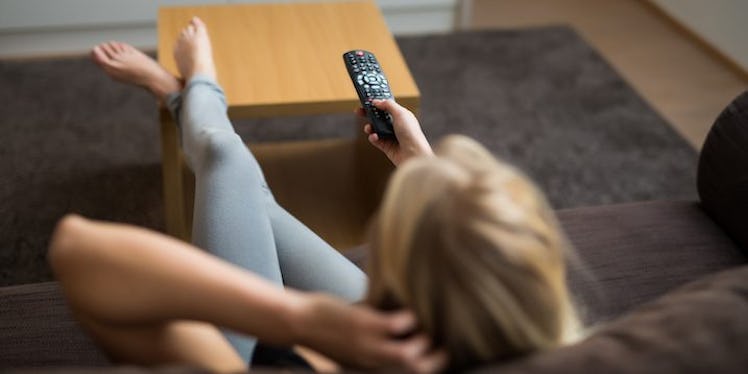
A Researcher Came To Our Rescue And Defended Binge Watching, Finally
Last weekend, I literally binged the entire season of Netflix's new series 13 Reasons Why in one sitting.
And I felt like absolute shit while I was doing it.
Yes, that was partially due to the fact that it's hard not to feel bummed out while watching a show centered around a young girl who committed suicide and left behind tapes to name the friends who led her to her demise.
But, it's the same crappy feeling I get whenever I binge-watch a show, happy or sad. It's a feeling where I can't help but think about how little I contributed to the world by indulging so deeply in a completely fictional story.
But, according to Elizabeth Cohen, a communications professor at West Virginia University, there's no real reason why I need to propel myself into this weird shame-spiral when it comes to binge-watching.
She wrote in a recent post on The Conversation,
Even though watching TV gets a bad rap as the 'junk food of media diets,' it can be good for you — as long as you give yourself permission to indulge.
So, the guilt we all tend to feel when gorging on season after season of TV show is totally self-prescribed and, to put it bluntly, useless.
In most cases, no one is actually judging you for spending 13 total hours in the same spot on the couch.
If you can summon the courage to give yourself permission to binge-watch, then there isn't anything wrong with that behavior.
Plus, as Cohen argues, TV was once thought of as a sort of "mindless" activity. Background noise masquerading as legitimate entertainment, if you will.
But think about how much more complex TV series have gotten in recent years, not to mention how many of them are often based on novels — and no one shames anyone for reading a whole book in one day.
Cohen wrote,
When individuals binge watch, they are thought to have what's called a 'flow experience.' Flow is an intrinsically pleasurable feeling of being completely immersed in a show's storyline.
In case you're still not convinced, Stephen Johnson, a published author and media theorist, wrote in The New York Times about the cognitive benefits of engaging in that special "flow experience" while you're binge-watching.
Johnson said,
Think of the cognitive benefits conventionally ascribed to reading: attention, patience, retention, the parsing of narrative threads. Over the last half-century, programming on TV has increased the demands it places on precisely these mental faculties.
So, go ahead and take a cue from Elsa on this one: let it go. Let yourself binge-watch without all the guilt.
And, speaking of Elsa, go binge some Disney movies. BECAUSE YOU CAN.
Citations: A Researcher Wrote the Defense of Binge-Watching You've Been Waiting For (New York Magazine), What's behind TV bingeing's bad rap? (The Conversation), Watching TV Makes You Smarter (The New York Times)